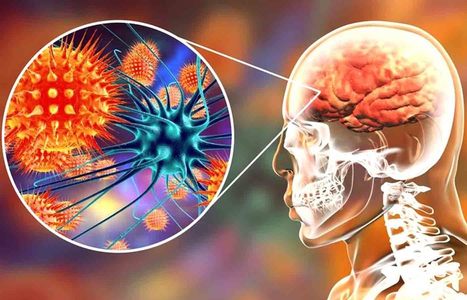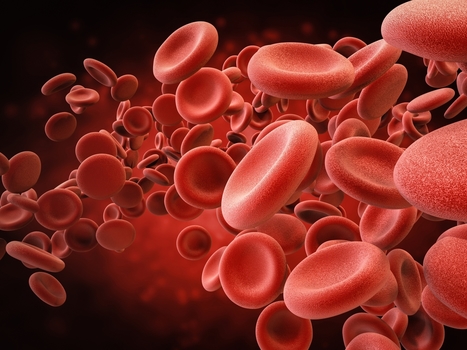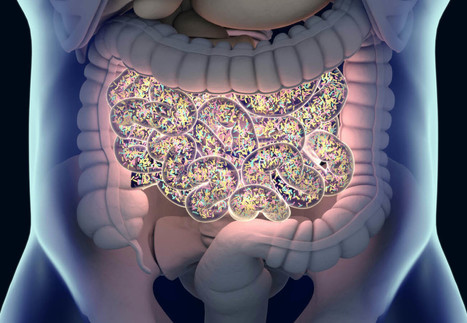 Your new post is loading...
 Your new post is loading...
Scientists and healthcare professionals are starting to shine a light on the importance of the composition of our gut microbiome, or the population of “healthy” bacteria in our gastrointestinal (GI) tract. According to research studies, abnormal or excess amounts of gut bacteria can be one of the most common causes of a variety of digestive health issues, including SIBO and IBS. Our ancestors have included fermented foods like yogurt, kimchi, and sauerkraut as an important part of their traditional diet to regulate and manage the composition of their “healthy” bacteria: the gut microbiome. Finding ways to naturally improve our digestive health by maintaining a “healthy” probiotic profile has been a popular topic for many generations. As a result, eating fermented foods like those previously listed above, including other food groups with additional probiotics, and taking probiotic supplements has tremendously increased in popularity in recent years. Another way to naturally improve digestive health that has recently become more popular is fasting, strategic abstinence or reduction from several or all foods for a certain period of time. Fasting can ultimately help improve overall digestive health. Fasting can help support the healthy composition of our gut microbiome and it can be used as a treatment approach for a variety of conditions and diseases, such as headaches, migraines, eczema, metabolic syndrome, and obesity. Scientists and healthcare professionals have determined that fasting can stress the human body in a beneficial way. This stress benefits the healthy bacteria in the gastrointestinal (GI) tract because it helps activate autophagy or the natural cellular detoxification process. In the following article, we will discuss how fasting and autophagy can promote digestive health.
Do you experience bloating after eating a meal? While many people may not experience this symptom, it’s important to understand that any amount of bloating is generally abnormal and it can be a sign of gut inflammation. If you regularly experience bloating, or you have irritable bowel syndrome (IBS), there’s a chance that you may have small intestinal bacterial overgrowth (SIBO). In the following article, we will discuss the top 10 red flags of SIBO.
Do you frequently eat processed foods that are bagged or boxed? Do you frequently eat fried foods? Do you have difficulty digesting foods? Do you experience constipation or inconsistent bowel movements? Do you have increased bloating or gas? If so, you may be experiencing SIBO symptoms. Small intestinal bacterial overgrowth (SIBO) is a serious health issue that happens when bacteria that generally grow in one region of the digestive system, such as the colon, grow in the small intestine, ultimately affecting the gastrointestinal (GI) tract. If left untreated, SIBO can commonly cause pain, discomfort, diarrhea, and malnutrition (because of the loss of nutrients), among other symptoms. Proper nutrition can help decrease these harmful bacteria. Following the SIBO diet together with antibiotics can also help speed up recovery and ultimately help reduce uncomfortable symptoms. The purpose of the article below is to describe the benefits of following the SIBO diet as well as what foods you should and shouldn’t eat to help improve SIBO symptoms. Understanding the SIBO Diet The SIBO diet involves gradually eliminating several types of foods in an attempt to help reduce inflammation in the gastrointestinal (GI) tract and help decrease bacterial overgrowth in the small intestine. In a variety of instances, the gradual elimination of sugars alone can help improve SIBO symptoms. Healthcare professionals recommend including a diet that is low in FODMAPs, or carbohydrates that can be difficult to digest and can become fermented by gut bacteria in the colon. When the digestive system is unable to break down carbs, these can sit in the gut and can cause SIBO symptoms, such as bloating and diarrhea. With SIBO, the bacterial overgrowth in the small intestine may ultimately start to ferment carbs too soon, causing a variety of symptoms.
Many research studies have arguably analyzed how gluten can affect the nervous system. However, people with celiac disease and non-celiac gluten sensitivity have demonstrated a variety of symptoms, ranging from headaches and brain fog to autoimmune disease. Moreover, brain health issues, such as anxiety, depression, and migraines, among others, are also common symptoms in people with gluten sensitivity or intolerance. Gluten ataxia, a severe autoimmune disorder, affects a small percentage of the population. Evidence suggests that brain health issues, such as schizophrenia and bipolar disorder, may also be affected by gluten. In the following article, we discuss several common gluten-related brain health issues.
Approximately 100 trillion bacteria are found in the gastrointestinal (GI) tract or gut, including Bacteroides, Bifidobacterium, Faecalibacterium, and Ruminococcus, among many others. These microscopic organisms, known as the microbiome, help digest food, process nutrients, and produce immune molecules which helps heal injuries and fight inflammation. Surprisingly, however, the gut microbiome plays a much more fundamental role in the brain. Although the brain and the gastrointestinal tract seem to be two independent parts of the human body, they are actually connected through a series of biochemical communications between nerve cells and immune pathways, known as the gut-brain axis. Bacteria create neuroactive compounds in the gut, including up to 90 percent of all of our neurotransmitter serotonin, which ultimately helps control our mood. Moreover, the brain also sends signals to the digestive system, by way of instance, to stimulate or suppress digestion. In the article below, we will discuss the brain and the gut microbiome connection.
How often do you feel more susceptible to pain? Autoimmune brain diseases, such as autoimmune encephalitis and central nervous system (CNS) vasculitis, can tremendously affect an individual’s overall physical and mental health. And, because many of the symptoms can vary from person to person, it can frequently be challenging to diagnose an autoimmune brain disease. Early diagnosis is fundamental for early treatment, as many of the symptoms may ultimately be reversible.
Do you often feel energy level drops in the afternoon? Do you often crave sugar and sweets in the afternoon? Do you often have difficulty concentrating before eating? Various medical conditions can affect the overall health of our body and mind. However, research studies have found that anemia caused by iron deficiency can tremendously affect our brain health. Iron deficiency is considered to be one of the most prevalent nutritional health issues, affecting approximately 2.5 billion people worldwide. In developing countries, about 40 percent of children and 50 percent of pregnant women have an iron deficiency. Iron is an essential mineral found in 5 percent of the earth’s crust, but, inefficiency in absorption, low iron levels in staple grain foods, and a variety of medical conditions can make iron deficiency a common problem among humans. In first world countries, iron deficiency is still one of the most common nutrient deficiencies.
Do you often feel that your energy levels drop in the afternoons? Do you often feel brain fog or have unclear thoughts and poor concentration? Do you often experience brain fatigue with chronic pain and inflammation? Diet and supplements are essential for overall well-being. However, fish oil omega-3s are a common supplement with a variety of health benefits. Fish oil is a well-known supplement that comes from fatty fish, such as sardines, anchovies, mackerel, and salmon. Fish oil has two types of omega-3 fatty acids, known as eicosapentaenoic acid (EPA) and docosahexaenoic acid (DHA), both of which are commonly used to support skin and heart health. Fish oil supplements can also promote brain health, especially when it comes to improving memory and mood problems like depression, as well as a variety of other health issues. The purpose of the following article is to discuss how the omega-3 fatty acids in fish oil may support and promote brain health.
How often do you feel unclear thoughts or concentration and brain fog? How often do you experience pain, discomfort, and/or inflammation? How often do you feel mental and physical fatigue after eating meals? Inflammation is an essential immune response, however, chronic inflammation, especially in the brain and the joints, can cause a variety of health issues. Fortunately, there are many natural remedies that can help reduce inflammation, including turmeric or curcumin. Turmeric, sometimes known as Indian saffron or the golden spice, is a tall plant that grows in Central America and Asia. The turmeric that we commonly see on shelves and in spice cabinets is made of the ground roots of the plant. Moreover, the bright yellow color of processed turmeric has inspired many cultures to use it as a dye. Ground turmeric is also the main ingredient in curry powder. Capsules, powders, teas, and extracts are several ways that turmeric is available commercially. Curcumin is the active ingredient found in turmeric and it has many powerful biological properties. Ayurvedic medicine, a traditional Indian system of treatment, recommends utilizing turmeric for a variety of health issues, including chronic pain and inflammation. Western medicine has started to evaluate the use of turmeric as a pain reliever. In the following article, we will discuss the health benefits and risks of turmeric as well as how these can affect overall health and wellness.
How often do you get fatigued after meals? How often do you have difficulty falling into deep, restful sleep? How often do you feel more susceptible to pain? Chronic brain inflammation can cause numerous symptoms which are commonly associated with a wide variety of neurological diseases. Fortunately, researchers and healthcare professionals have found a natural remedy that can help improve chronic brain inflammation and it can provide many more health benefits: turmeric. For centuries, researchers and healthcare professionals alike have been studying the many health benefits of turmeric. In recent decades, however, research studies are attempting to verify the claims of our ancestors by testing turmeric in numerous clinical trials. Curcumin has been shown to have a wide variety of healing properties and practical uses. However, can turmeric improve chronic brain inflammation? In this article, we will discuss the benefits of turmeric for brain health.
How high is your stress level? How often do you feel overwhelmed? Anxiety is a well-known health issue that is, unfortunately, often misunderstood, especially when it manifests other misunderstood symptoms like brain fog. Brain fog is commonly associated with reduced thinking and processing while anxiety is frequently associated with racing thoughts that can make people overly cautious as well as worries that can keep people awake, wired, and restless. How does anxiety cause brain fog? The purpose of the following article is to understand brain fog associated with anxiety. How Does Brain Fog with Anxiety Happen? Brain fog is a symptom rather than a single health issue. It’s described as the sensation that your brain isn’t functioning properly. Anxiety involves symptoms of overthinking, excessive worrying, imagining negative outcomes, and fear. Brain fog and anxiety happens because the symptoms of one health issue can ultimately cause the symptoms of the other health issue and vice versa. This can also worsen both conditions. Brain fog and anxiety can cause an infinite loop. - Anxiety involves “what-ifs,” ruminations, and negative thinking
- This can then lead to mental exhaustion or fatigue
- Fatigue can also develop brain fog
- Brain fog can in turn increase anxiety because it feels frightening, worrisome
- Increased anxiety causes this cycle to repeat, seemingly endlessly
Brain fog associated with anxiety may vary from person to person. Several people will experience it often while others will experience it less frequently. It can also come and go quickly, or it can ultimately last for days, weeks, and even months. Evaluating the symptoms and the causes of brain fog and anxiety will provide insights that can be used for treatment.
How often do you feel you have something that must be done? How often do you have difficulty concentrating before eating? Do you suffer from migraines and/or headaches? A migraine headache is commonly characterized by a variety of symptoms, including pain and discomfort, photophobia or light sensitivity, dizziness, lethargy, and mood changes. However, one of the most common symptoms of migraine headaches is brain fog, which also causes its own variety of symptoms. In the following article, we will discuss brain fog associated with migraines and offer several simple tips to help manage migraine brain fog. What is Migraine Brain Fog? Several people experience migraine-associated brain fog before the severe headaches occur, although it most commonly occurs after the migraines have passed. As a matter of fact, a research study demonstrated that almost 70 percent of people with migraines experience brain fog, which can last from a few hours to several days or more. This percentage may be even higher as symptoms of confusion and difficulty focusing or concentrating are also frequently reported, all of which can suggest the presence of post-migraine brain fog. According to researchers, migraine brain fog can include symptoms such as: - forgetfulness or short-term memory loss
- loss of sense of direction
- inability to complete everyday tasks and activities
- a brain that feels as if it “doesn’t function properly”
- feeling as though you’re having to think through a fog
Migraine headache brain fog can make it difficult to participate and engage in daily tasks and activities. Cooking, which requires focus and concentration as well as multiple steps, may feel nearly impossible to do with this health issue. People who suffer from migraines may also feel that driving is downright dangerous, especially if their brain fog is accompanied by a lack of sense of direction. To others, people experiencing migraine brain fog may ultimately appear to be half-asleep.
Do you have low brain endurance when it comes to focus and concentration? Do you often feel like you must drink coffee or exercise to improve brain function? Have you been experiencing noticeable variation in your mental speed? How often do you pick up your smartphone and forget why? Many women commonly struggle to remember everyday tasks throughout their 40’s and 50’s. Research studies have determined that menopause is a prevalent cause of brain fog in women. What is Menopause Brain Fog? Many women between the ages of 40 and 50 may be going through menopause or the end of their menstrual cycles. Symptoms may vary for every woman and these can range from thinning hair to weight gain to night sweats. Many other women may also have general forgetfulness or “brain fog” which can ultimately make it hard for them to concentrate. During one research study, healthcare professionals found that about 60 percent of middle-aged women had trouble focusing or concentrating and other health issues associated with cognitive problems. These health issues increased in women going through perimenopause. Perimenopause is the stage before the menstrual cycle stops entirely. The women in the research study also reported experiencing subtle changes in memory but researchers believe that a “negative effect” may have worsened these symptoms. The researchers also found that women going through menopause generally experience negative changes in mood and other memory problems. Moreover, the research study found that brain fog may also be associated with sleep issues and other vascular symptoms associated with menopause like hot flashes. Another research study also found that women in the early stages of menopause may experience more noticeable cognition problems. Women during the first year of their last menstrual period scored the lowest on tests evaluating: - attention
- memory
- verbal learning
- working memory tasks
- motor function
Memory for the women improved over time, which is the opposite of what the researchers had initially hypothesized. Furthermore, healthcare professionals believe that midlife brain fog in women may be associated with hormonal changes. Estrogen, progesterone, follicle-stimulating hormone, and luteinizing hormone, are all responsible for different processes in the human body, including brain function. Perimenopause lasts an average of 4 years, during which time the hormone levels may ultimately fluctuate wildly and cause a variety of symptoms as the mind and the body adjust to these hormonal changes.
|
For many people, fasting, or the concept of willingly skipping meals for a specific period of time, may not seem like a very appealing way to improve digestive health. Because most people also eat about 3 meals a day, skipping one or two meals a day can ultimately cause them to feel moody, tired, and fatigued. However, for people with digestive health issues, such as SIBO, IBS, or leaky gut, they may already be feeling these symptoms, even after eating their 3 meals a day. In this article, we will discuss how fasting can be beneficial for some patients and how it can help improve their digestive health. Understanding the Digestive System The digestive system starts the process of breaking down food from the moment we eat in order to absorb nutrients, such as vitamins and minerals. The digestive system will use approximately 25 percent of the calories we consume to even start the process of digestion. Digesting food requires tremendous effort from the human body because it alters many of its main functions and pulls many resources away from other structures to simply perform it. The immune system also activates every time we eat food in order to protect the gastrointestinal, or GI, tract from anything and everything that passes through. When fasting, however, the digestive system can start to heal and restore the human body. During a fast, the human body will utilize fat instead of sugar as the main source of energy fuel. An average person only has about 2,500 Kcal of glycogen to use as glucose for energy while the average person has about 100,000 Kcal of fat for energy. Moreover, it may take time for the human body to become adjusted to utilizing fat instead of sugar as the main source of energy fuel, which is why many people may not feel well until several days after they’ve started fasting. Fasting can also ultimately have other benefits.
Do you have difficulty digesting protein-rich foods? Do you have difficulty digesting starch-rich foods? Do you have difficulty digesting fatty or greasy foods? Do you experience abdominal distention after meals? Do you have abdominal pain and inflammation? If so, you may be having SIBO symptoms. Small intestinal bacterial overgrowth (SIBO) is a gastrointestinal (GI) tract health issue that can become a persistent problem if it’s not managed accordingly, especially if it’s ultimately left untreated. For many people suffering from chronic gas, bloating, constipation, and/or diarrhea, they may have also already had a diagnosis of irritable bowel syndrome (IBS). However, research studies have shown that one of the main causes of IBS may be SIBO. SIBO is a digestive health issue where there are too many bacteria in the small intestine. Bacterial overgrowth can also cause IBS. Although there are many treatment options for SIBO, one of the most important treatments for SIBO is doing everything we can to help keep SIBO from coming back. The purpose of the following article is to discuss how understanding the migrating motor complex (MMC) can help treat small intestinal bacterial overgrowth (SIBO).
Do you feel irritable, nervous, shaky, or light-headed between meals? Do you have difficulty eating large meals in the morning? Do you feel fatigued after meals? Do you have sugar and sweet cravings after meals? Do you have an increased appetite? If so, you may be experiencing early SIBO symptoms. SIBO, or small intestinal bacterial overgrowth, is a severe health issue that ultimately affects the small intestine in the digestive system. This gastrointestinal (GI) tract condition happens when the bacteria that generally grows in several different regions of the gut begin to grow in the small intestine. SIBO can commonly cause pain, discomfort, and diarrhea, among other symptoms. It can cause malnutrition as bacteria utilize the body’s nutrients.
Do you feel like grain consumption makes it difficult to focus or concentrate? Or does grain consumption make you feel like it leads to tiredness? Do you feel like grain consumption causes the development of any symptoms? Are you on a 100% gluten-free diet? Diet and environmental factors can affect brain health. Researchers and healthcare professionals have associated one specific component with neurological disease: gluten. Brain health issues and neurological diseases have tremendously increased over the last several years. As a matter of fact, approximately 20 percent of adults in the United States have a diagnosable mental disorder and unfortunately, those statistics are expected to increase over the next few years. Depression is the most common cause of disability worldwide while anxiety affects more than 40 million Americans today. Moreover, Alzheimer’s disease is currently the sixth-leading cause of mortality in the United States. A 2013 research study demonstrated that deaths associated with brain diseased have increased 66 percent in men and 92 percent in women since 1979. And, there’s one factor that all of these brain health issues and neurological diseases have in common: inflammation. Foods play a fundamental role in inflammation. There are many foods that will increase inflammation in the brain and body, arguably the biggest culprit is gluten.
How often do you get irritable, shaky, or have light-headedness between meals? How often do you have difficulty concentrating before eating? How often do you feel agitated, easily upset, and nervous between meals? Many researchers and healthcare professionals believe that your brain and gut are connected. Moreover, recent research studies have demonstrated that the brain can affect gut health and the gut can affect brain health. The communication system between your brain and gut is known as the gut-brain axis. In the following article, we will discuss the gut-brain axis. Understanding the Gut-Brain Axis The gut-brain axis is the communication network that connects your gut and brain. These two fundamental organs are both physically and biochemically connected in a variety of different ways. The neurons and the vagus nerve are essential for the brain and central nervous system (CNS). There are approximately 100 billion neurons in the human brain. The gut itself also contains about 500 million neurons, all of which are connected to the brain through nerves found in the nervous system. The vagus nerve is one of the largest nerves connecting the gut and brain. It sends signals in both directions. By way of instance, in several animal research studies, stress can ultimately affect the signals sent through the vagus nerve and it can also cause gastrointestinal health issues. Another research study conducted on humans found that people with irritable bowel syndrome (IBS) or Crohn’s disease had decreased vagal tone which suggests the decreased function of the vagus nerve. One research study in mice found that feeding them a probiotic reduced the amount of stress hormone in their blood. According to the research study, however, when the vagus nerve was cut, the probiotic had no effect. The brain and gut are also ultimately connected through chemicals known as neurotransmitters. Neurotransmitters created in the brain help regulate mood, including feelings and emotions. Furthermore, the neurotransmitter known as serotonin can help manage happiness and it also helps control the circadian rhythm or the human body’s internal clock. Surprisingly, many of these neurotransmitters are also created by the cells and the trillions of microbes living in the gut. A large amount of serotonin is developed in the gut. Gut microbes also produce a neurotransmitter known as gamma-aminobutyric acid (GABA) which helps regulate feelings of fear and anxiety. Research studies in mice found that probiotics increase GABA and decrease anxiety and depression.
Do you often feel low brain endurance for focus and concentration? Do you often crave sugar and sweets in the afternoon? Or do you feel energized after meals? Glucose, or sugar, is the main source of energy in the human body. And, because the human brain has so many nerve cells or neurons, it is one of the most energy-demanding organs, which utilizes about one-half of all the energy from glucose in the human body. Sugar is important but too much of it can also have its downsides. Brain functions, such as memory, thinking, and learning, are relatively associated with glucose levels and how efficiently the brain utilizes this essential energy fuel source. If there isn’t enough glucose, or sugar, in the brain, by way of instance, neurotransmitters, or the human brain’s chemical messengers, don’t develop properly and the communications between neurons can ultimately break down. Additionally, dysglycemia, a common health issue caused by abnormal blood glucose levels, can cause loss of energy for brain function and has also been associated with poor attention and cognitive function. “The human brain is dependent on sugar or glucose as its main energy fuel source,” stated Vera Novak, MD, Ph.D., an HMS associate professor of medicine at Beth Israel Deaconess Medical Center. “It just simply cannot be without it.”
Biomarkers are molecules that can help diagnose a health issue. These have become important for verifying investigations, choosing the best remedies, and monitoring disease progression. One exception, however, includes biomarkers for neurological diseases. Neurological biomarkers are found in the cerebral spinal fluid (CSF) or, in undetectable amounts, in the blood vessels. The human brain is closely guarded by the blood-brain barrier which protects it from damaging compounds circulating throughout the blood vessels. The blood-brain barrier has made it inaccessible to use these biomarkers. Biomarkers may be analyzed using the CSF but this also needs an invasive lumbar puncture process. Biomarker signatures, or recent improvements in discovery, in addition to the ability of clusters of biomarkers, are currently helping to make neurological disorders more treatable and more reachable. Treating and preventing neurological disorders, such as chronic traumatic encephalopathy (CTE), Alzheimer’s disease, Parkinson’s disease, autism, and major depressive disorder, is very likely to become less difficult to diagnose with the recent arrival of neurological biomarkers found in the blood.
Neurological diseases, including well-known neurodegenerative disorders like Alzheimer’s disease (AD) and Parkinson’s disease (PD) as well as other rare health issues, such as Huntington’s disease (HD) and amyotrophic lateral sclerosis (ALS), affect millions of people worldwide. Unfortunately, these are estimated to increase due to the aging population. Currently, there is no treatment available for any neurodegenerative disorder. Treatments for symptoms are available for several neurological diseases, such as PD and HD, but the therapeutic benefits are limited. Although the causes and symptoms for these health issues are different for each neurodegenerative disorders, their molecular pathogeneses share common underlying factors and characteristics, including excessive levels of reactive oxygen species (ROS), mainly due to mitochondrial impairment, neuroinflammation, and disturbances in protein homeostasis (proteostasis). This increases the possibility of developing a universal treatment that will focus on targeting the common triggers of neurological diseases.
How often do you feel more susceptible to pain, discomfort, and inflammation? Rheumatoid arthritis (RA) is an autoimmune disease that affects about 0.5 to 1.0 percent of the adult population throughout the world. Evidence suggests that the autonomic nervous system (ANS) plays a fundamental role in the management of an abnormal immune response and inhibition of inflammation. The ANS regulates cytokine production through the cholinergic anti-inflammatory pathway, including the efferent vagus nerve, the neurotransmitter ACh, and its receptors (α7 nicotinic ACh receptor, α7 nAChR). Turmeric, or curcumin, has historically been utilized as a spice and a medicinal herb in India and China. Evidence suggests that curcumin affects diverse bioactivities. In recent years, a variety of research studies have shown that consuming curcumin considerably ameliorated collagen-induced arthritis (CIA). A clinical trial has shown that curcumin is a safe and effective natural remedy for RA patients. However, pharmacokinetic research studies have shown that its bioavailability can be very poor which raises the question, how does curcumin, or turmeric, produce an anti-inflammatory effect?
How often do you feel agitated, easily upset, and nervous between meals? How often do you depend on coffee to keep yourself going? How often do you have difficulty concentrating before eating? Inflammation is an essential reaction of the human body. It’s triggered by the immune system to protect us from injury, infection, and/or illness. However, what happens if there is too much inflammation in the human body? And, what happens if there is too much inflammation in the brain? Neuroinflammation can cause a variety of health issues, such as anxiety, stress, depression, brain fog, fatigue, and even lethargy, among other well-known symptoms. Fortunately, there is one natural remedy that can help tremendously reduce inflammation and improve brain function. According to research studies, curcumin can help combat neuroinflammation. The purpose of the article below is to discuss the anti-inflammatory effects of curcumin in microglia, brain health, and wellness.
How often do you feel you have something that must be done? How often do you have difficulty concentrating before eating? Do you suffer from headaches and/or migraines? Head pain is commonly characterized by a variety of symptoms, including pain and discomfort, photophobia or light sensitivity, dizziness, lethargy, and mood changes. However, one of the most common symptoms of head pain is brain fog, which also causes its own variety of symptoms. In the following article, we will discuss brain fog associated with head pain and pressure as well as the common cause of brain fog and headache/migraine. Many patients will commonly visit healthcare professionals reporting mild or moderate head pain and pressure as well as a variety of other symptoms, such as brain fog, fatigue, and even vision problems, among others. The patients frequently experience a "constant cloud" over their brain and they generally never have a clear head or mental clarity. Many patients will commonly report numerous other symptoms, including poor short-term memory, detachment from reality, sharp pain and discomfort in the head, and ringing in the ears. Many others report anxiety, caused or worsened by the symptoms. Brain Fog and Head Pain The first approach towards characterizing brain fog associated with head pain is to make sure it's not caused by a secondary headache or a headache with an identifiable cause. Several types of head pain are more severe than others, such as giant cell arteritis or inflammation of the arteries that run along the temples, raised blood pressure or hypertension, brain hemorrhage, brain infections like encephalitis, increased pressure in the fluid of the brain or raised intracranial pressure, and brain tumors. Less severe types of head pain include carbon monoxide poisoning, taking too many painkillers or medication-overuse headache, disorders of the joints of the jaw or temporomandibular joint disorders, dental problems, and sinus infections or sinusitis. Below, we will discuss several of the most common causes of brain fog associated with head pain.
Do you have difficulty concentrating before eating a meal? Do you experience fatigue after meals? Do you feel as if you’re not getting enough rest or sleep? Do you have noticeable variations in mental speed? If so, you may have brain fog. What is Brain Fog? Brain fog is a health issue that can occur due to a variety of factors. You may struggle to focus on everyday tasks, conversations, or even on the words you’re currently reading. You may also have difficulty making choices where minimal decisions can be overwhelming, you may need coffee to concentrate or snacks to stay awake and even alcohol at night to temporarily relieve the brain fog. In severe instances, you may also have headaches, vision problems, and nausea. What Causes Brain Fog? Brain fog is a symptom rather than a single health issue. It can occur due to nutrient deficiency, bacterial overgrowth from consuming too much sugar, sleep disorder, depression, or even due to thyroid problems. Other common causes of brain fog can ultimately include eating too much and too often, lack of exercise or physical activity, not getting enough rest or sleep, chronic stress, and a poor diet. Below, we will discuss several of the most common causes of brain fog and brain health issues.
|



 Your new post is loading...
Your new post is loading...

































Fasting is a well-known, strategical way of eating which can have a variety of digestive health benefits for many people. Many people can tremendously benefit from fasting. Fasting can activate autophagy, or the natural cellular detoxification process, to help sweep excess bacteria and undigested food debris away for elimination as waste, also activating anti-inflammatory processes to reduce inflammation and oxidative stress. However, it’s important to keep in mind that fasting may not be for everyone. Make sure to talk to a qualified and experienced doctor before attempting any fasting approaches. For more information, please feel free to ask Dr. Alex Jimenez or contact us at (915) 850-0900.